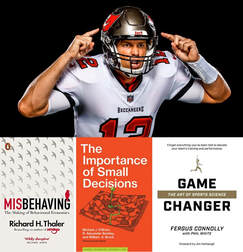
I was reminded of Thaler’s work by developments in recent weeks. The trade that exchanged Jared Goff for Matthew Stafford involved the Rams giving up draft picks. Does this illustrate the benefits from trade or the pull of instant gratification? It should be noted that some commentators suggest that giving up first round draft picks can help teams avoid criticism like the Bears got for their drafting of Mitchell Trubisky before Patrick Mahomes and Deshaun Watson.
Thaler’s work draws attention to decision making errors. One could argue that he was forced to over emphasise this aspect to get a hearing in economics where the default is to assume that human decision making is correct (or self-correcting). Again, recent developments are worth considering. Dak Prescott’s new deal with the Cowboys can be interpreted in a variety of ways. Some suggest he is now being overcompensated because he was undercompensated previously. A sort of market correction. Others suggest that Jerry Jones made an error by not doing a deal with Dak earlier.
Dak himself spun a different story. Dak saw his new deal as helping other players by raising the bar for all players looking to negotiate a new deal. He has a point. But he may damage his team’s ability to hire - especially in a year where the salary cap is coming down. Some might say that Dak is not making the “rational choice” that Tom Brady has previously made. In The Importance of Small Decisions Brady’s structuring of his deals in New England was presented as being aligned with the economist’s idea of rational choice (here is a previous blog on this point). I wonder if that example overplays the success of Brady’s decision making in a way that Thaler may overplay the errors in the draft.
If The Importance of Small Decisions makes it to a second edition then I guess that Brady’s decision to move to Tampa will be included. Another ring followed that decision. (How might it view Brady's decision to engage in practice with teammates that possible broke coronavirus restrictions?)
Few economists claim that the rational choice model explains every aspect of decision making. Most think it is a very useful framework. If it explained all choices then why would we have to include the "rational" part. Rational choice was one of four quadrants in The Importance of Small Decisions. Thaler tends to place it within one of two systems of decision making. These two systems are roughly captured by the title of a book by Daniel Kahneman - Thinking, Fast and Slow. These systems are also present in Thaler's co-authored Nudge: Improving Decisions About Health, Wealth, and Happiness. In these publications, one system is slow, conscious, and deliberative (not inconsistent with rational choice). The other system is fast, intuitive, and automatic. Many decision making errors are attributed to this second system. Kahneman allows that experts make less of these errors but he is careful to circumscribe the circumstances where this applies (see here). The default emphasis of Thaler and Kahneman is on the errors in human decision making.
The Importance of Small Decisions uses Tom Brady as the poster boy for rational choice. I have not come across Kahneman or Thaler using Tom Brady to illustrate to successes of human decision making. It is hard to imagine. One of Thaler's favourite characters is Homer Simpson (he complains that rational choice uses characters like Star Trek's Mr Spock). We need to look outside of economics to find Brady playing a similar role for fast, intuitive, automatic decision making. In Game Changer: The Art of Sports Science Fergus Connolly takes four pages to describe 2.3 seconds of Tom Brady’s decision making in a Super Bowl. Four pages for 2.3 seconds. Connolly is slow and deliberative in describing a decision making process that is fast and instinctive. Connolly talks about inputs being transformed into actions in “auto pilot mode” and without some of the inputs making it “all the way to his brain”. An expert decision maker in action.
When it comes to decision making in economics, and in sport, too often we over emphasise either the successes or failures of decision making. It is the mixture that makes it interesting.
 RSS Feed
RSS Feed